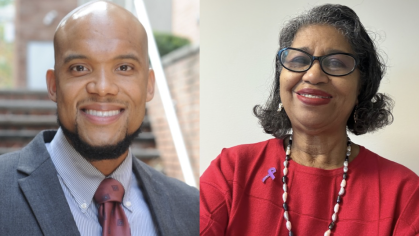Dr. Katherine Marçal is an assistant professor at Rutgers School of Social Work and has expertise in housing insecurity and homelessness among families with children, maternal and child mental health, and community-based system dynamics. She shares the importance of observing Hunger & Homelessness Awareness Week from November 11-18, 2023.
Tell us a bit about your journey to social work.
Originally, I wanted to be a journalist. I have always been interested in people’s stories, and I saw journalism as a tool for giving voice to marginalized groups. Ultimately, I entered the field of social work because I wanted to take a more activist role in some of the stories I was reporting. For my first MSW practicum placement, I worked in a federally qualified health center providing case management to individuals and families experiencing homelessness in St. Louis, MO. I started to understand the complex needs and strengths of this population, as well as the vast gaps in our service systems to truly help families stabilize. My early research focused on promoting healthy child development for families served in homeless shelters. Since then, my work has broadened to examine some of the structural barriers that make safe, stable, affordable housing inaccessible to so many people across the United States.
What is the significance of Hunger and Homelessness Awareness Week for you?
To me, Hunger and Homelessness Awareness Week is about recognizing (1) the sheer number of families who face risk of hunger and homelessness and (2) the plethora of solutions we have available to reduce this burden. People tend to think of “the homeless” as a distinct population separate from the rest of us. In fact, a huge portion of American families struggle to make their rent and mortgage payments each month, and thus face the risk of losing their housing. Often, these families are making impossible tradeoffs every day about which basic needs to prioritize – making rent payments on time or going to the doctor? Buying enough food to eat or paying the electric bill? Housing costs have rapidly outstripped wages, and there often simply isn’t enough money to meet basic needs like shelter, food, medical care, transportation, and education. We often see families struggling with both housing and food insecurity at the same time, or mothers going hungry so their children will have enough to eat and the rent gets paid.
That said, we have a number of great strategies for reducing housing cost burden on families so they are better able to meet these basic needs. The COVID-era housing relief policies showed us that pausing evictions and offering rental assistance kept people housed. Pairing these assistance programs with tweaks to our zoning and tax codes that prioritize density in high-opportunity areas can make affordable housing accessible for millions more Americans.
How can the social work community recognize and commemorate Hunger and Homelessness Awareness Week?
This week is a wonderful opportunity for the social work community to recognize the creativity and adaptability of people experiencing hunger and homelessness. We can also familiarize ourselves with some of the organizations leading the way on solutions. Monarch Housing Associates is a wonderful local organization active in housing advocacy across New Jersey with lots of opportunities for engagement. The National Low Income Housing Coalition is a national organization committed to increasing access to affordable housing.
What can the social work profession or social workers do to continue to support individuals facing hunger and/or homelessness beyond this month?
Hunger and homelessness impact so many of our clients who may be seeking services for other reasons. Social workers should screen for food and housing insecurity that may prevent clients from engaging with services or experiencing their full benefits. The social work community should recognize the vast preventable morbidity and mortality associated with hunger and homelessness, as well as the long history of racist zoning and lending practices that have shut Black Americans out of the housing market for generations. Continued attention toward addressing longstanding racial disparities that perpetuate ongoing health inequity is a key task of the social work profession. Social workers can advocate for programs and policies that treat housing as a human right and promote increased and equitable affordable housing supply in areas with major employment, education, and resource opportunities.



